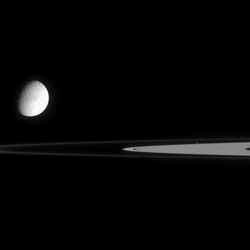
The two moons Tethys and tiny Atlas. Image credit: NASA/JPL/SSI Click to enlarge
This view from Cassini contains not one, but two moons. Tethys is slightly overexposed so that the real target of this image, tiny Atlas, can be seen. Atlas is at image center, just outside the A ring.
A couple of faint ringlets are visible in the Encke Gap, right of center. Tethys is 1,071 kilometers (665 miles) wide; Atlas is a mere 32 kilometers (20 miles) wide.
The image was taken in visible light with the Cassini spacecraft narrow-angle camera on Dec. 21, 2005, at a distance of approximately 2 million kilometers (1.2 million miles) from Tethys and 1.7 million kilometers (1.1 million miles) from Atlas. The image scale is 12 kilometers (7 miles) per pixel on Tethys.
The Cassini-Huygens mission is a cooperative project of NASA, the European Space Agency and the Italian Space Agency. The Jet Propulsion Laboratory, a division of the California Institute of Technology in Pasadena, manages the mission for NASA’s Science Mission Directorate, Washington, D.C. The Cassini orbiter and its two onboard cameras were designed, developed and assembled at JPL. The imaging operations center is based at the Space Science Institute in Boulder, Colo.
For more information about the Cassini-Huygens mission visit http://saturn.jpl.nasa.gov . The Cassini imaging team homepage is at http://ciclops.org .
Original Source: NASA/JPL/SSI News Release
